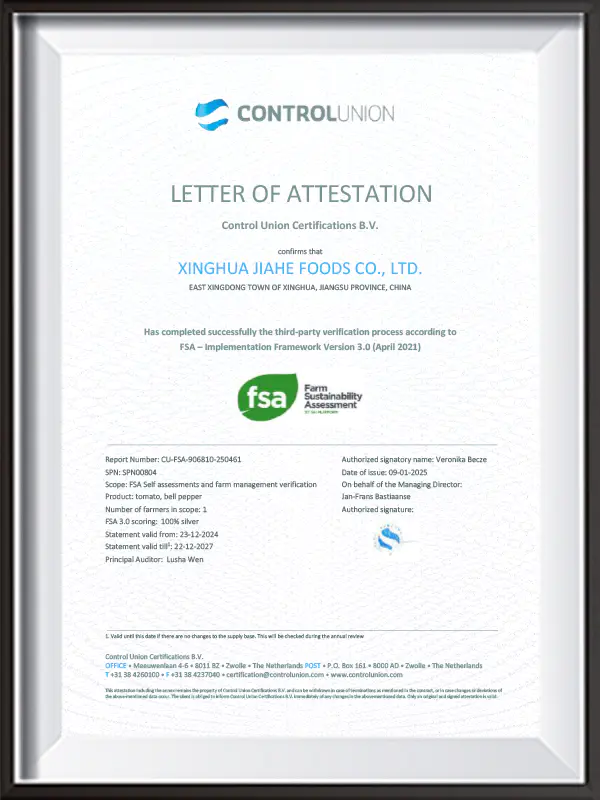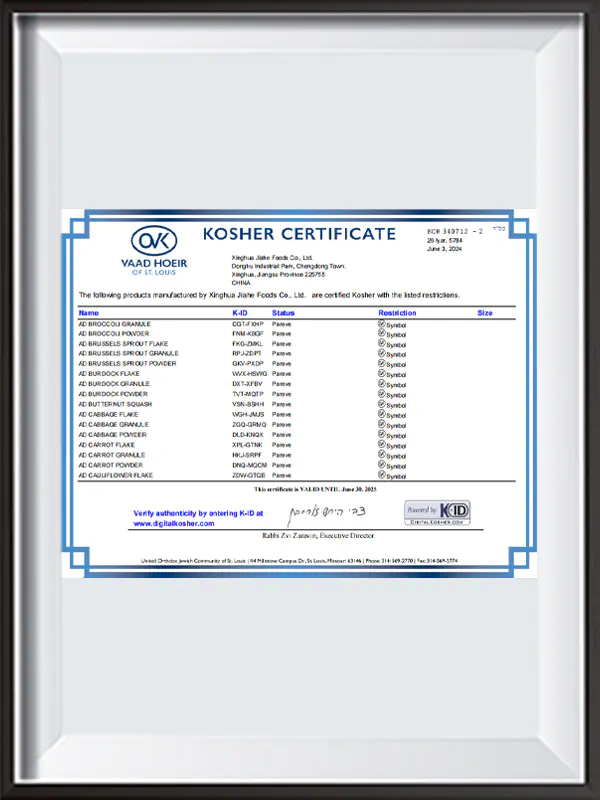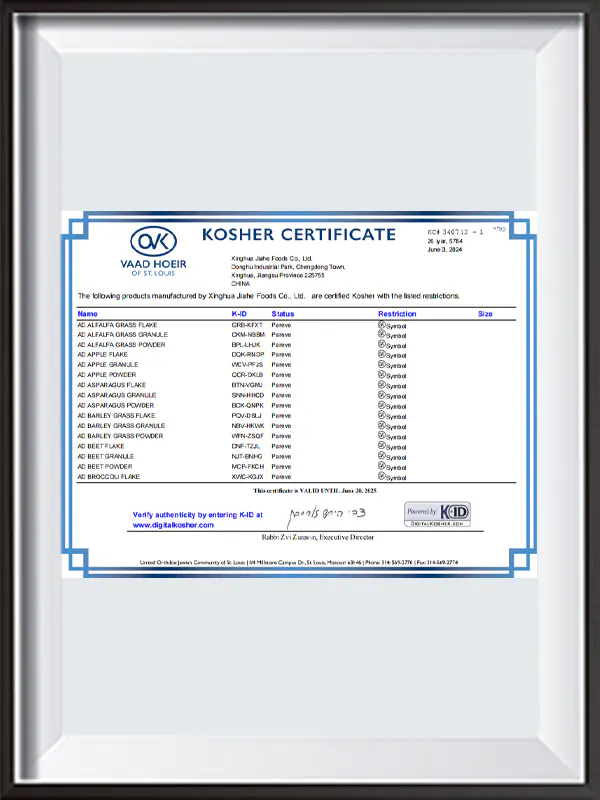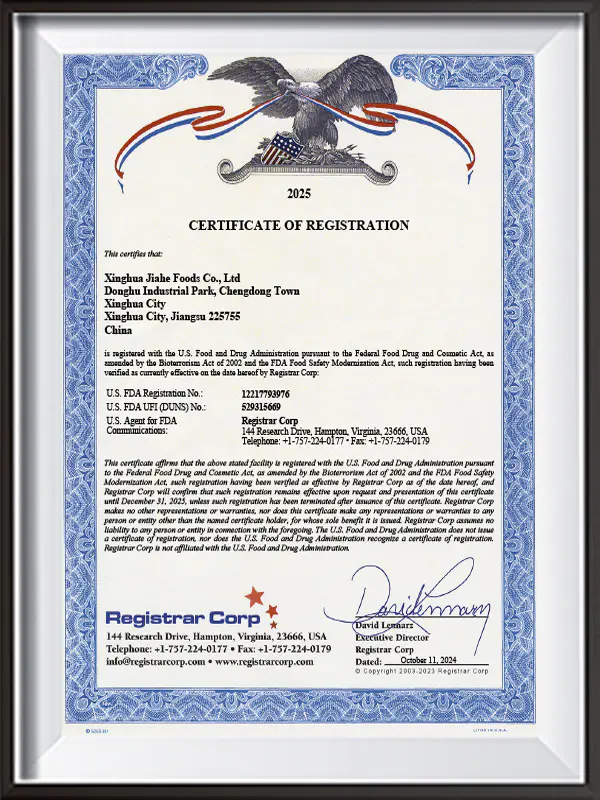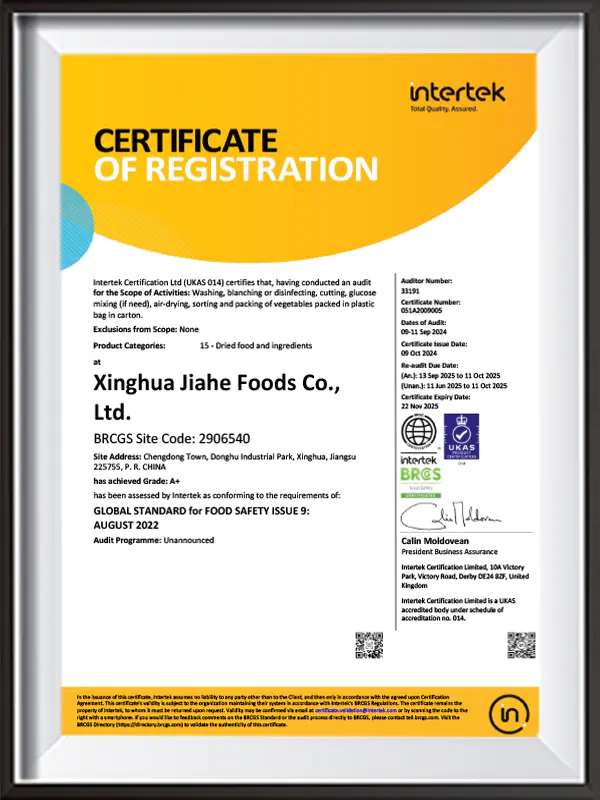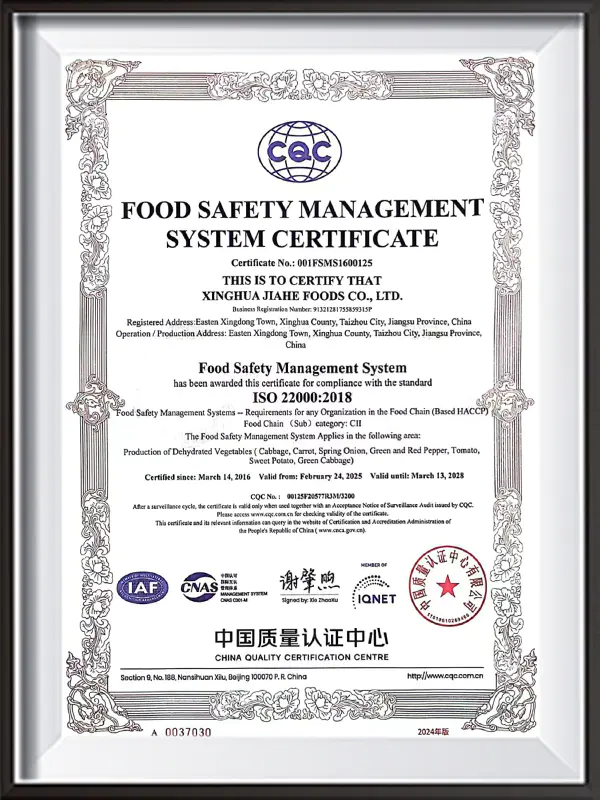Xinghua Jiahe Foods Co., Ltd is China Dehydrated Carrot Manufacturers and Dehydrated Carrot Factory, located in Xinghua city Jiangsu province, established in 2003. We are an experienced manufacturer and distributor of air dried vegetables and fruits in China. After more than 10 years fast development, now we are proud of being one of the top 3 manufacturers in China. We have built ourselves as a whole-range of consistent, affordable, and safe food products to the ingredient market. Our plant takes up an area of 25`000㎡with an annual capacity 8000 tons. We also have more than 300 hand-sorting workers, this is the last critical control point. Some defect materials which are out control of the facilities will be removed clearly. We have a multiple supply range. As Dehydrated Carrot Exporter & Importer, we can supply you not only flake, dice, granules -- but also powder according to your need. All finish products are made from selected, fresh materials.
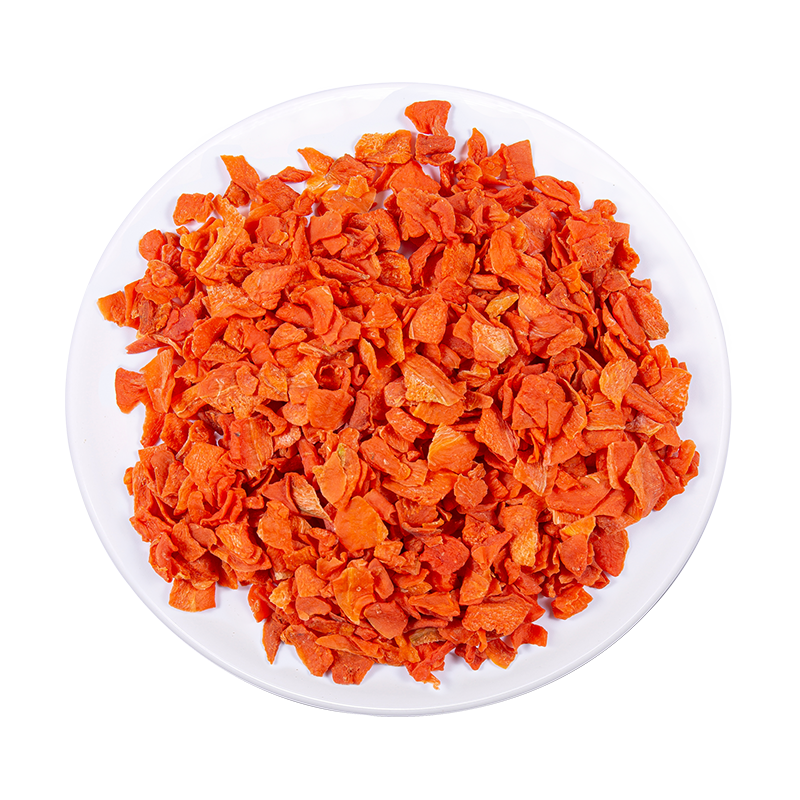
Dehydrated Carrot
Field fresh carrots which are washed, steam peeled, sorted, cut, blanched, and dried.The processing sequence initiates with rigorous cleaning protocols, material segregation, and HACCP compliance measures before proceeding to particle size modification via blade cutting or abrasive milling techniques
- CROSS CUT/SHOESTRING STRIPS/POWDER
- 3/8"
- 1/4"
- -8+40
- CUSTOM SIZE
Dried carrots are widely used in a variety of food applications, including seasoning blends, salad dressings and salad products, sauces, soups and stews, pasta products, hummus, rice-based dishes, chips and snacks, cheese and dairy products, meat and sausage products, ready-to-eat meals, and pet food formulations
Authentic reliable quality naturally stands out and fears no comparison.
Provide you with the latest enterprise and industry news.
-
How resistant is the Dehydrated Green Pepper to microbial growth, mold, or spoilage during storage and transport?
Low Moisture Content: One of the most critical factors contributing to the microbial stability of Dehydrated Green Pepper is its extremely low moisture content achieved during the dehydration process. Water is a fundamental requirement for the growth of bacteria, yeast, and mol...
-
How should Dehydrated Tomato be stored to maintain its shelf life, color, and flavor over time?
Temperature Control Maintaining the proper storage temperature is critical for preserving the quality of Dehydrated Tomato over time. Ideally, it should be stored in a cool, dry environment between 10–25°C (50–77°F). Elevated temperatures accelerate chemical reactions such as Mai...
-
How does the particle size, cut type (shredded, sliced, diced), or granulation of Dehydrated Cabbage affect rehydration performance and application in food processing?
Particle Size and Surface Area:The particle size of Dehydrated Cabbage has a profound effect on its water absorption rate, rehydration kinetics, and suitability for different culinary applications. Smaller particles or finely shredded cabbage present a higher surface-area-to-vo...
What are dehydrated carrots and how are they made?
Dehydrated carrots are made by removing water from fresh carrots to extend their shelf life and make them easier to store and transport. This process usually includes washing, steam peeling, sorting, cutting, blanching and drying. During the production process, the removal of water not only allows the carrots to be preserved for a long time, but also maintains their original flavor, nutrients, color, texture and other characteristics.
The production of dehydrated carrots begins with the selection of raw materials. All carrots must undergo a rigorous washing process to remove dirt, pesticide residues and other impurities. This process is essential to ensure the hygiene and safety of the final product, especially in a production environment that complies with HACCP standards. HACCP is a food safety management system that aims to ensure the hygiene and safety of the product throughout the production process by carefully monitoring each link of the production process.
After washing, the carrots will enter the steam peeling stage. Peeling by steam heating can maximize the retention of carrot nutrients and natural flavor, avoiding the nutrient loss that may be caused by traditional peeling methods. The peeled carrots are then sorted to remove unqualified parts, ensuring that only the best quality raw materials enter the subsequent process.
Next is the cutting and blanching process. According to the final use requirements after dehydration, the carrots are cut into appropriate particles or slices, which is usually done by knife cutting or grinding. On this basis, in order to protect the nutrients in the carrots and improve their taste, the carrots need to be blanched. The role of blanching is to stop the activity of enzymes through a short period of hot water immersion, prevent the loss of nutrients, and maintain the bright color of the carrots.
The last step is drying. In order to maximize the retention of carrots' nutrition, color and taste, the drying process of dehydrated carrots usually adopts low-temperature airflow drying (airflow drying). This drying method ensures that the carrots maintain high quality while removing moisture.
Why does the production process of dehydrated carrots require strict quality control?
The production process of dehydrated carrots requires strict quality control, which is the key to ensure that the product ultimately meets the health and safety needs of consumers. Any negligence at any step may affect the quality and safety of the product. Therefore, every link from raw material procurement to the output of the final product must be carefully monitored and managed.
Quality control starts with raw material procurement. Only carefully selected fresh carrots can enter the production line. Suppliers must provide raw materials that meet quality standards and pass the corresponding acceptance inspection to ensure that there are no pesticide residues, pests and diseases, and other sources of pollution. In the process of carrot cultivation, the company also needs to adopt scientific planting techniques to ensure the healthy growth of carrots. This is particularly important because the final quality of dehydrated carrots directly depends on the quality of raw materials.
In the processing link, each production process needs to be precisely controlled. Taking cleaning as an example, clean water must be used, and the water quality, temperature, time and other parameters of each cleaning stage must be strictly controlled to avoid secondary contamination of carrots during the cleaning process. The application of steam peeling technology is to minimize losses and avoid over-processing. The control of steam temperature and time is very important. Inappropriate temperature and time may cause the loss of carrot nutrients or changes in appearance color.
During the cutting and blanching process, the uniformity of the cutting size and the precise control of the blanching temperature and time are crucial to the taste, color and nutrition of the final product. To ensure this, many manufacturers will use automated equipment and adjust various production parameters through real-time monitoring systems to ensure that each batch of products meets quality standards.
One of the most important links is the drying process. The temperature and time of the drying process need to be strictly controlled, because too high a temperature will cause the loss of nutrients in the carrots, and too low a temperature may not completely remove the moisture, thus affecting the shelf life of the product. At this point, many companies will choose the air drying process to maintain the color and nutrition of the carrots through a precise temperature control system.
In order to ensure that each batch of products meets safety and quality standards, multiple laboratory tests are required throughout the production process. Common experimental projects include physical and chemical parameter testing, microbial testing, and testing of harmful substances such as pesticide residues and heavy metals. Through this series of tests, the safety of dehydrated carrots can be ensured and meet the standard requirements of the international market.
What are the applications and market prospects of dehydrated carrots in the industry?
Dehydrated carrots are widely used in many industries, especially in the food processing industry, due to their excellent shelf life and convenient storage and transportation characteristics. Since dehydrated carrots can not only retain the natural flavor of carrots, but also greatly reduce storage costs, they are widely used in convenience foods, fast food, condiments, canned foods and snacks.
In the catering industry, dehydrated carrots are widely used in ready-to-eat meals, soups, dishes and condiments. Because of its easy storage and use, many catering companies choose to use dehydrated carrots in dishes that need to increase carrot ingredients. It can be added directly to soups or stir-fries without long-term washing, cutting and cooking, which greatly saves production time and costs.
Dehydrated carrots are also widely used in the food processing industry. In the ready-to-eat food and fast food industries, dehydrated carrots are a common raw material that can improve the color and nutritional value of food. In the production of condiments and sauces, dehydrated carrots are often used as one of the additives to enhance the taste and mouthfeel of the product.
With the improvement of consumers' health awareness, the market demand for dehydrated carrots has gradually expanded. More and more consumers are choosing foods rich in natural nutrition, and carrots have become a healthy food ingredient due to their rich beta-carotene, dietary fiber and multiple vitamins. Especially in the context of the increasing popularity of fitness, vegetarianism and organic food, dehydrated carrots have gradually occupied a larger market share due to their health and nutrition.


 English
English Français
Français Español
Español
